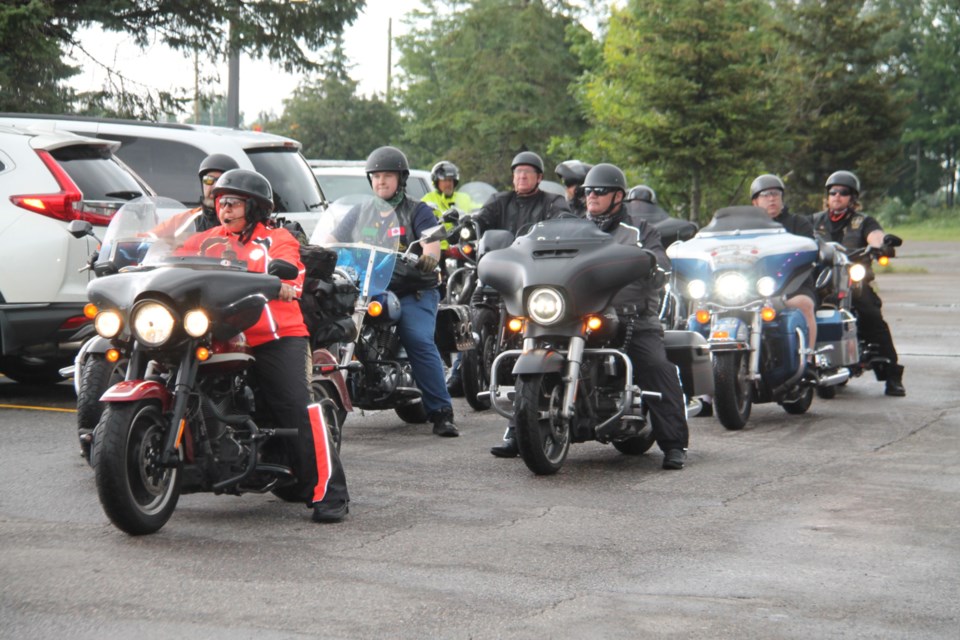The Sault’s James Seaton, a Canadian Army veteran, was one of 18 Sault and area residents who met up and rode Wednesday with members of The Rolling Barrage, a group of Canadian veterans currently motorcycling across the country to raise awareness and funds to treat Canadian Armed Forces members, veterans and first responders with PTSD.
“These guys are great to be with, a great group to be a part of,” said Seaton, speaking to SooToday after a core group of Barrage riders and supporters rumbled into The Water Tower Inn’s parking lot.
Seaton, a member of the Veterans UN/NATO Canada Sault club, joined the Barrage by meeting up with them in Thessalon and rode through Wednesday’s fierce rain storm which included hail at one point along Highway 17.
Forty-eight riders in total arrived at the Sault hotel, dinner and overnight accommodation to be provided by The Water Tower Inn’s owners before they resume their voyage Thursday.
Groups of supporters join The Rolling Barrage core group in stretches across Canada.
Seaton served in the Canadian army from 1984 to 1987.
“I’m one of the fortunate ones, but a lot of the guys, I know, struggle with different degrees of PTSD. Some are very able to maintain a semblance of a regular life and others really struggle, where they don’t even want to go out of their house. But once you serve, you make connections for life. It’s true. We all have that same connection. It’s a brotherhood and a sisterhood. We’re just trying to make people aware of what we’ve gone through,” Seaton said.
“This makes it easier for them to adjust to civilian life.”
“You go away and volunteer and you come back, and there’s something different. It’s hard for a civilian to understand, who has never experienced anything a veteran has done, whether it’s the training or the things they’ve seen and the impact that leaves on them. It affects your train of thought, it affects your emotions because you feel you have to box everything... the bike ride is a form of therapy,” Seaton said.
“When you get out of the military, you've left your ‘family’ and you’re empty...you have to completely readjust your entire life. PTSD is a very invisible illness,” said Mandy Dickson.
She and her husband Scott are from the Sault and now live in Goulais River, Scott having served in the Canadian military for several years at bases in Canada and currently dealing with PTSD.
“This is his outlet, to be around others...it’s very personal for me,” she said, being the wife of a veteran.
“I feel that I owe it to my brothers and sisters who have fallen. I did two tours myself, in Bosnia. I’ve experienced a lot. I lost ‘brothers.’ I didn’t go to Afghanistan but I lost dear friends in Afghanistan,” said one local veteran in attendance, his eyes filling with tears.
He told us that due to the nature of his employment, he did not wish to be named or photographed.
The man is a Sault native and resident, a member of the Veterans UN/NATO Canada’s Sault club (like Seaton).
“These last two years have been hard on them. We’ve got to get out there and help these guys and say there are people and organizations who can help, have dinner together and do something. I don’t have PTSD, but I feel the void.”
He met the group in Thessalon, then left before the storm to finalize arrangements for Wednesday’s dinner at The Water Tower Inn.
Many veterans who are members of Veterans UN/NATO Canada were on hand Wednesday.
“We’re not a motorcycle club,” said veteran Keith McAllister.
“Basically the Veterans UN/NATO Canada is a big ‘chicken wing’ club. We’re designed to get past members of the Canadian Forces, or still-serving members, out one night a week for chicken wings, a beer or other beverage of their choice, just to have camaraderie, and if they’re having a bad day, go out and talk with their military brother or sister to help them get through it,” McAllister said.
Veterans UN/NATO Canada members will help fellow veterans, struggling with PTSD, fill out Veterans Affairs paperwork, McAllister said.
“This is where our group comes in handy, being able to sit down with a member and (for example) write out their applications for a disability claim. We help out with The Rolling Barrage as much as we can. We’re not in the limelight a lot but we try to be supportive for all veterans’ groups,” McAllister said.
Veterans UN/NATO Canada is a part of the larger Veterans UN/NATO, which has other chapters around the world.
Southern Ontario-based McAllister, who served in the Canadian Army, first in the infantry and then as vehicle technician, told us he has been diagnosed with PTSD and deals with it through medical help and art therapy.
Most of his military career was spent at CFB Petawawa, but McAllister also served in Bosnia and Afghanistan.
He joined up with this year’s Barrage ride in Barrie, met up with a comrade in the Sault and plans to head home tomorrow.
2021 marks the fifth consecutive ride for The Rolling Barrage.
A core group of riders began the Barrage by heading out from Nova Scotia Aug. 2 after dipping the rear tires of their motorbikes into the Atlantic.
They anticipate dipping their front tires into the Pacific when they reach BC Aug. 21.
“It (the Barrage ride) is important just because of the amount of awareness it brings to veterans’ issues, especially to a lot of smaller communities, from Halifax to British Columbia, that aren’t really aware of what veterans’ issues are. They do a lot of good fundraising,” said Brian Nadon, 49th Field Regiment, Royal Canadian Artillery (RCA) deputy commanding officer, who was on hand to greet the group at The Water Tower Inn.
Information on The Rolling Barrage, including how to make a donation, may be found online and Facebook.
